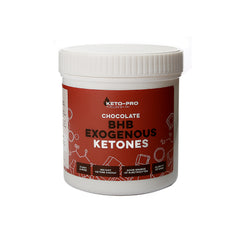News
Keto for Bone Strength??
Keto for Bone Strength??
The metabolic state of ketosis produces a ketone body called Beta-Hydroxybutyrate or BHB for short. Studies show that living a ketogenic lifestyle and or supplementing with Exogenous BHB can help prevent the deterioration of bone density by stopping the production of cells called osteoclasts.
The body produces osteoblasts to build bone tissue and osteoclast to breakdown down tissue, which is a natural process within a healthy individual but can cause terrible issues with people prone to bone degradation.
Findings of this study (*1)
‘it was found that 3HB or 3HBME down-regulated the nuclear factor of activated T-cells cytoplasmic 1 (NFATc1), which is the transcription factor of pre-osteoclast differentiation. When NFATc1 activation and downstream functions were inhibited, 3HB or 3HBME was able to strongly reduce pre-osteoclast differentiation. As a result, bone absorption was prevented. It was demonstrated that 100 mg/kg 3HB resulted in the most obvious effect on osteoporosis prevention’
shows that the ketone body Beta-hydroxybutyrate stops osteoclasts and by doing so reverses and possibly prevents the breakdown of bone tissue while increasing the resistance of bone deformation.
This study evaluated the effects of BHB on growth of osteoblasts in vitro and on anti-osteoporosis in vivo (*2) The conclusion here was that BHB boosted the strength of the femur. BHB can be an effective bone growth stimulating implant materials.
Other ways to help increase bone density and strength?... Vitamin D3 and K2.
Vitamin D3 and K2 work synergistically to metabolise calcium within the body. Vitamin D3 increases calcium absorption and vitamin K2 sends it to where it’s needed.
Vitamin K2 promotes calcification of the bones aiding with conditions such as osteoporosis and reduces the effects of calcification of the arterial walls helping to reduce the risk of cardiovascular disease.
This study (*3) indicates that consuming vitamin D3 & K2 together increases bone mineral density, compared with calcium administration. This means consuming calcium alone isn’t enough, we need at Vitamins D3 & K2 to increase bone density
Why Vitamin D3 & K2?
There are 2 types of Vitamin D.
-
D2 – or ergocalciferol
-
D3 – or cholecalciferol
Vitamin D2 is a plant form of vitamin D. As such, it doesn’t work as well in human biology as Vitamin D3 does, because Vitamin D3 comes from animal sources. This study (*4) found Vitamin D3 to be 70% more effective than Vitamin D2.
The best sources of D3 are
Oily fish such as sardines, mackerel, salmon & animal meats and organ meats such as beef liver, beef, eggs & fish roe.
There are 2 main types of Vitamin K.
-
K1 – or Phyllaquinone
-
K2 – or Menaquinone
Again, vitamin K1 is mostly a plant form of vitamin K so the body has to convert this into K2 (A form that fits human biology) unfortunately, the body is inefficient at doing this, so the best and most bio-available form is K2.
Vitamin K1 is mainly sent to the to the liver to regulate the production of coagulation, while vitamin K2 is used in other tissues such as bone and the vascular wall.
Vitamin D and K are fat soluble vitamins, so they are best taken with dietary fat, or C8 MCT oil... Perfect for the Keto Lifestyle.
The best sources of K2 are
Beef liver, egg yolk, beef, pork, chicken
Protein and Minerals are essential to make bone
We can slow the degradation of bone through calcium supplementation, but calcium alone can’t build bone. This study which was carried out on 342 elderly men and women shows that supplementing with both calcium and vitamins D could slow down bone loss, but not build, adding medium amounts of protein saw a small improvement in bone in bone density while the group on high protein saw a significant improvement in mineral bone density! (*5) This is incredible, as the common belief is that bone mineral density declines with age and can't be built, we’re told we can only slow the degradation with age, this study was carried out on men and women over the age 65!! further highlighting the importance of protein in our diet.
Protein yes... but what minerals do we need to build bone?
-
Calcium
-
Sodium
-
Magnesium
-
Potassium
-
Phosphorus
-
Chloride
Bone is made of each one of these minerals, including sodium. In-fact, there is a direct correlation between sodium and calcium in regards to building bone. One can’t increase without the other as recorded by Harold E. Harrison during a study called ‘The Sodium Content of Bone and Other Material.’
Further evidence that we require more minerals than just calcium to build bone are highlighted by this study (*6) Here, 11 patients were fed intravenously, by doing so the investigators had complete control over the nutrients the patients were receiving which were protein, glucose, calcium, sodium, potassium, magnesium phosphorus and chloride. Through a process of elimination, removing one of these at a time they recorded that whenever protein, sodium or phosphate were removed, the bodies' ability to build bone tissue came to a halt!
- So, to sum up, we’ve learned that living a ketogenic lifestyle can help build bone as our bodies produce Beta-Hydroxybutyrate.
-
We’ve learned that vitamin D3 & K2 can help with calcium absorption and sending it to where it needs to be and being fat soluble vitamins, these are best taken with fat to increase absorption.
-
And possibly more importantly, we’ve learned that we can’t build bone without protein and certain minerals, specifically Sodium & Phosphorus.
What are the best sources of protein, minerals and fat?... Animal meats and organs.
Adding further weight that living a ketogenic / animal-based lifestyle with lots of protein & fats, while producing Beta-hydroxybutyrate may give us a metabolic advantage in building and maintaining bone strength and density.



